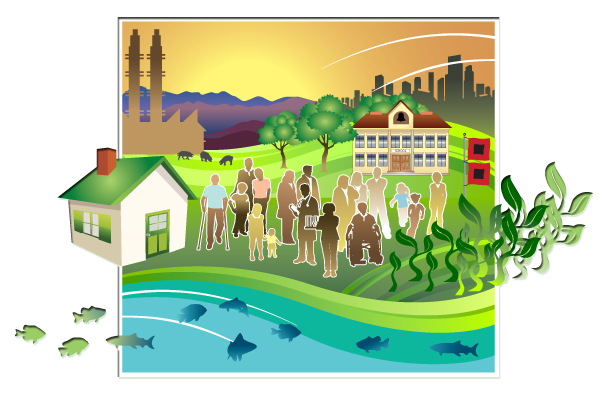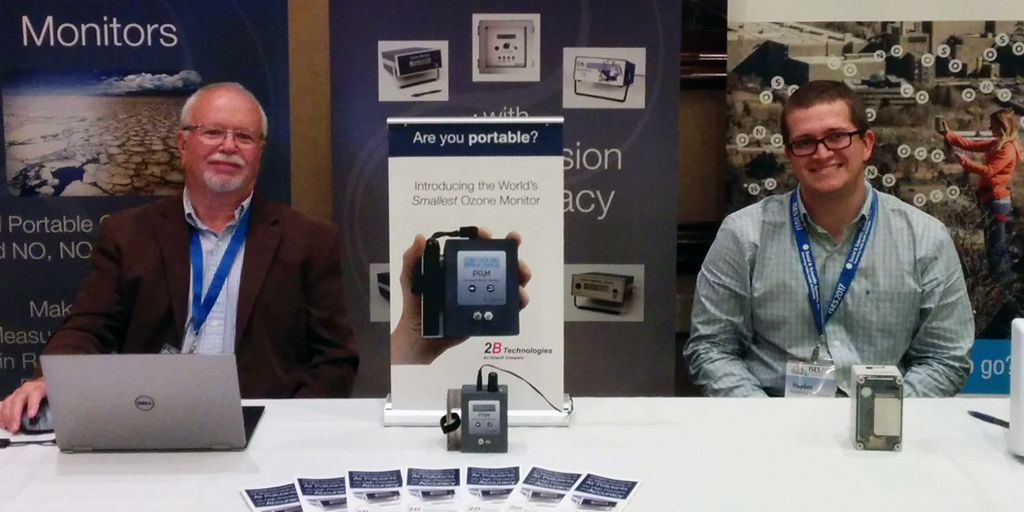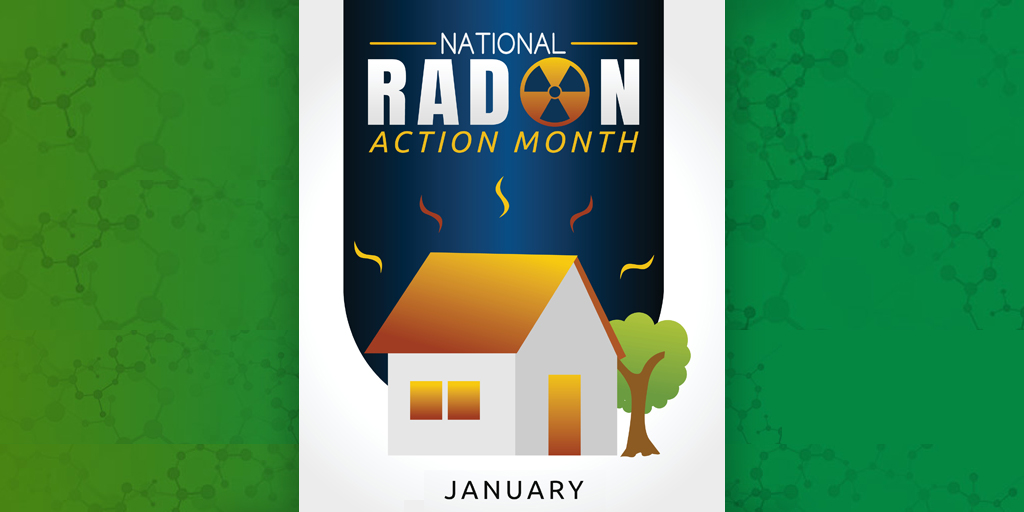High School Students Become Citizen Scientists to Reduce Radon Exposure
When it comes to building community capacity for reducing environmental risks, a new approach of engaging high school students as citizen scientists shows promising results. After residents in both Ohio and Kentucky expressed concern about radon exposure and its link to lung cancer, researchers with the community engagement cores (CEC) at the University of Kentucky (UK) and the University of Cincinnati (UC) teamed up with two high schools and took action on home radon testing. The project was both feasible and effective, with high rates of returned test kits and valid results.
As the researchers were setting up the study, they formed ideas to maximize community benefits. First, they knew testing rates increase when citizen scientists are engaged in the research. Additionally, the researchers wanted to involve students to promote youth empowerment and enhance relationships between their academic institutions and the community. The researchers worked with teachers who had community-academic research experience and who were active in their communities. Together, the researchers and teachers developed a plan to address radon exposure using a citizen science approach with high school students. The study, High School Students as Citizen Scientists to Decrease Radon Exposure, reports on their approach.
“Radon exposure is the second leading cause of lung cancer, but in most Appalachian communities, less than 1% of homeowners test for radon,” said Ellen Hahn, Ph.D., R.N., who conceptualized the study and directs the UK Center for Appalachian Research in Environmental Sciences (UK-CARES). “We know the power of citizen science to engage the public in research and to prompt action. By giving high school students a meaningful and central role in real-life research, we wanted to see if they could become effective citizen scientists and champions for home radon testing.”
Students first learned about the project in their science classrooms. The researchers and teachers taught students at one rural Appalachia school and one suburban Ohio school about human subject protection principles and the basics of radon exposure. After the first session, students were free to join the project as citizen scientists as long as they had parental consent and agreed to other project requirements. The citizen scientists then received further education on radon testing and mitigation, the health effects of radon, evaluating radon data, and how to consent a parent or other adult to test the home for radon.
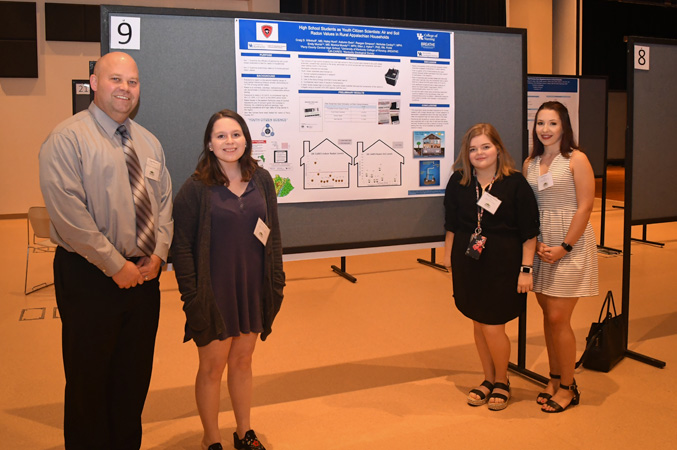
Craig Wilmhoff, a high school teacher involved in the radon project, stands with students Autumn Gwin, Raegan Simpson, and Haley Hurd from Perry County Central High School in Hazard, Kentucky, at Appalachian Research Day. (Photo courtesy of Craig Wilmhoff)
For each participating household, students administered home radon tests and a parent or other adult completed a survey. Later, students reported household-specific results back to the adult. Students also presented their findings to the community. Furthermore, the researchers offered financial and other radon mitigation resources to households with high indoor radon.
“It was promising that over two-thirds of the participants returned the test kits. The rate of return is typically much lower with more traditional approaches,” said Hahn. “Our results pave the way for sustainable and authentic youth engagement by using citizen science approaches to tackle an important environmental health concern.”
A Unique Collaboration Between Two Community Engagement Cores
Before teaming up for the radon project, UK-CARES’ CEC and UC’s CEC had worked together on two citizen science projects to test water and air quality with adults and youth, and the radon project built on their past collaborations. Even with this strong history of partnership, each CEC brought unique strengths to the radon project.
The UC’s CEC built on its prior experience deploying citizen science water testing toolkits. These toolkits, which include instructions and devices for measuring pH and dissolved solids, allow community members to analyze local water quality. By providing these kits, the CEC empowers communities to collect data and enact local change around environmental health issues. Additionally, although the radon study was the first time students were engaged to increase radon testing rates, UC's CEC has regular youth engagement activities. For example, the CEC partners annually with a local museum to connect environmental health graduate students with grade school youth to educate them on the health implications of environmental exposures. Both the graduate students and grade schoolers benefit from these events: the graduate students gain real-world experience in youth engagement and communication, while the youth are empowered to make decisions that reflect positive environmental health outcomes.
UK, through its Bridging Research Efforts and Advocacy Toward Healthy Environments (BREATHE) program, brought expertise in addressing radon exposure as a public health issue. Researchers, led by Hahn, tested the effectiveness of a personalized environmental report back intervention to reduce co-exposures to radon and tobacco smoke in the home. Recently, BREATHE researchers partnered with the Kentucky Geological Survey to create a novel comic book, “Invisible Enemy: The Rise of Radon,” which focuses on NIEHS-funded radon research.
The strong relationship between the two universities allowed researchers to access more resources than they had at either institution alone, and this cross-institutional approach helped the feasibility project’s success.
Two Benefits for the Price of One: Increasing Radon Testing and Student Environmental Health Literacy

Are you enjoying the PEPH newsletter? Are there topics you'd like to see discussed more often? Please take a few minutes to provide feedback.
While radon exposure accounts for 10-15% of lung cancer cases, U.S. radon testing rates are low. Citizen science approaches have been shown to increase testing rates, and Hahn is hopeful that the feasibility project is just the beginning of a sustained and effective effort to increase radon testing.
“Bringing citizen science to high school science classrooms was a feasible approach to increase testing rates in communities where residents had expressed concern about environmental exposures and lung cancer,” said Hahn. “But we need more research on the impact of integrating citizen science projects into the school curricula on environmental health literacy and on testing and remediation behaviors.”
Because radon is colorless, odorless, and tasteless, it is an invisible enemy, so raising awareness can be tricky. Citizen science is a promising approach to increase a community’s understanding of radon and to prompt action. Hahn attributes part of the project’s success to the teachers’ leadership and enthusiasm, the students’ eager participation in the classroom sessions, and the students’ active and meaningful engagement and interest in the research.
NIH Resources for Community Leaders About COVID-19, Inclusion, Disparities, and Vaccines
NIH’s Community Engagement Alliance (CEAL) Against COVID-19 Disparities provides trustworthy information through active community engagement to the people hardest-hit by the COVID-19 pandemic. Since part of CEAL’s work is to support and expand community outreach efforts, there are many resources available to community leaders to address vital information needs. NIH encourages all community leaders to use and share CEAL’s resources when discussing COVID-19 topics such as inclusion, vaccines, clinical trials, and COVID-19 basics. Each topic has a variety of resources. For example, the resources on inclusion include fact sheets, handouts, videos, social media messages and images, and websites in both English and Spanish. The inclusion resources cover topics such as minorities in clinical trials and why diversity is important in medical research.
New Healthy Garden Habits Infographic
Adults and children who spend time in gardens may be exposed to soil contaminants, which can occur naturally or be human-made. Children may have higher exposures than adults because they may play in the dirt and put their hands into their mouths. Children are also more vulnerable to the negative effects of certain contaminants. Safe habits can reduce exposure to soil contaminants, and Duke University’s Superfund Research Center recently created an infographic about healthy gardening habits. The colorful infographic lists suggestions in three areas that can help reduce human exposure: preparing your garden, protecting yourself and your family, and preventing introduction of new contaminants.
Environmental Health Perspectives Journal Focuses International Program on Low- and Middle-income Countries
The journal Environmental Health Perspectives (EHP) recently announced that it is refocusing its international program on a broad group of low- and middle-income countries, a change from its prior emphasis on reaching Chinese-speaking countries. EHP will discontinue the Chinese edition of the journal. The journal’s program will now focus on a larger group of countries that face a disproportionate burden of environmental health challenges. These countries may lack evidence-based resources and capacities to address ongoing environmental health disparities. The journal will establish partnerships to reach new international audiences to help develop environmental health sciences. For example, partnerships with scientific societies to mentor investigators and build capacity for rigorous science are planned. EHP invites submissions about environmental health issues in low- and middle-income countries.
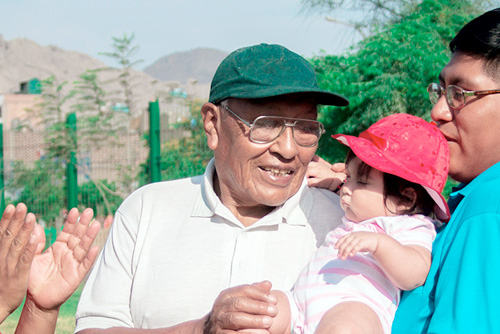
PEPH Environmental Health Chat Podcast Series
Using Culturally Appropriate Messages to Promote Smoke-free Homes
PEPH Environmental Health Chat Podcast Series
Using Culturally Appropriate Messages to Promote Smoke-free Homes
To be effective, public health messaging around tobacco use should be culturally sensitive and account for the fact that tribal communities often use tobacco in ceremonial, medicinal, and religious traditions. In this podcast on Using Culturally Appropriate Messages to Promote Smoke-free Homes, you’ll hear from Patricia Henderson, M.D., who works with tribal communities to encourage smoke-free homes. Henderson, an NIEHS-funded researcher, is vice president of the Black Hills Center for American Indian Health, a nonprofit organization that works to improve the health of American Indian tribes.
You can find more podcasts on the Environmental Health Chat webpage or subscribe to the series on iTunes. We want your feedback! Send comments and ideas for future podcasts to [email protected].

PEPH Grantee Highlight
Angela Reyes
Angela Reyes, founder and executive director of the community-based Detroit Hispanic Development Corporation (DHDC), has devoted her career to addressing environmental justice issues and creating healthier communities in Detroit. DHDC provides self-empowerment and educational opportunities for disadvantaged youth and families in order to build healthy and safe communities. Reyes also is a member of the Stakeholder Advisory Board of the University of Michigan’s Lifestage Environmental Exposures and Disease Center, and she works closely with NIEHS grantees through this partnership, helping to ensure that research results are disseminated effectively. For example, DHDC and University of Michigan researchers work together to foster community-based participatory research aimed at improving health and quality of life in communities disproportionately affected by air pollution. Reyes also serves in an advisory capacity for the Southwest Detroit Community Benefits Coalition which is working to ensure that communities near a bridge construction site receive protections and benefits to protect their quality of life. This project was featured in the January PEPH newsletter in Sustained Community Mobilization Leads to Neighborhood Benefits.
Funding Opportunites
Environmental Influences on Aging: Effects of Extreme Weather and Disaster Events on Aging Populations (R01 Clinical Trial Optional)
Supports research to advance our understanding of the impact of extreme weather and disaster events in aging human populations. This FOA (PAR-19-250) and its companion FOA (), which focuses on underlying mechanisms of aging utilizing animal models, will help explicate the behavioral, biological, and socioecological processes that occur during extreme weather or disaster events that affect aging processes. Through the integration of the population studies and the companion mechanistic studies FOA, the goal is to improve the health and well-being of older adults via increased knowledge about extreme weather and disaster preparedness, response, and recovery.
Deadline: July 7, 2020; November 9, 2020; March 8, 2021
Letter of Intent: Due 30 days prior to the application due date
Application of Artificial Intelligence and Machine Learning for Advancing Environmental Health Sciences (R41 Clinical Trial Not Allowed)
Solicits Phase I Small Business Technology Transfer (STTR) grant applications from small business concerns (SBCs) to develop promising methodologies using Artificial Intelligence (AI) and Machine Learning (ML) approaches to advance environmental health research and decisions. When further developed and validated, these methodologies or approaches should improve the accuracy of toxicity prediction, help in prioritizing chemicals for more relevant or targeted testing, identify and/or fill data or knowledge gaps in toxicity assessment, and promote more comprehensive understanding of human exposure effects, susceptibility, and adverse health outcomes.
Deadline: March 29, 2021
Letter of Intent: February 28, 2021
Application of Artificial Intelligence and Machine Learning for Advancing Environmental Health Sciences (R43 Clinical Trial Not Allowed)
Solicits Phase 1 Small Business Innovation Research (SBIR) grant applications from small business concerns (SBCs) to develop promising methodologies using Artificial Intelligence (AI) and Machine Learning (ML) approaches to advance environmental health research and decisions. When further developed and validated, these methodologies or approaches should improve the accuracy of toxicity prediction, help in prioritizing chemicals for more relevant or targeted testing, identify and/or fill data or knowledge gaps in toxicity assessment, and promote more comprehensive understanding of human exposure effects, susceptibility and adverse health outcomes.
Deadline: March 29, 2021
Letter of Intent: February 28, 2021
HEAL Initiative: HEALthy Brain and Child Development Consortium Administrative Core (U24 - Clinical Trial Not Allowed)
Seeking applications for a Consortium Administrative Core for the HEALthy Brain and Child Development (HBCD) Study. This FOA runs in parallel with companion FOAs that seek applications for linked and unlinked research sites and a single Data Coordinating Center. The HBCD Consortium Administrative Core (HCAC) will be responsible for providing the organizational framework for the management, direction, and overall coordination of the national multi-site consortium. It will coordinate the interactions of the individual Research Project Sites and the HBCD Data Coordinating Center. The HCAC will include Administrative and Project Management Plans, and will also be responsible for managing collaborative activities such as the functions of an Expert Scientific Board and oversight of an internal Steering Committee.
Deadline: March 31, 2021
Letter of Intent: March 1, 2021
HEAL Initiative: HEALthy Brain and Child Development Data Coordinating Center (U24 – Clinical Trial Not Allowed)
Seeking applications for a Data Coordinating Center for the HEALthy Brain and Child Development Study. This FOA runs in parallel with companion FOAs that solicit applications for linked and unlinked research sites and a single Consortium Administrative Core. The HBCD Data Coordinating Center (HDCC) will develop the procedures for collection of the core neuroimaging, neuropsychological, and other phenotypic assessment data in a manner that will maximize comparability across the individual research sites of the consortium. The center will perform quality control, data curation, and analysis for the measures collected from the research sites as well as provide data informatics tools for sites and NIH program staff to monitor consortium progress and performance and explore the curated data. The HDCC will facilitate cross-site pooling of data, create a database across assessment modalities, and harmonize with existing large-scale neurodevelopmental research efforts. The HDCC should include a director (or co-directors) and one or more associate directors to ensure that the wide scope of activities are seamlessly coordinated.
Deadline: March 31, 2021
Letter of Intent: March 1, 2021
HEAL Initiative: HEALthy Brain and Child Development Study (Collaborative U01- Clinical Trial Not Allowed)
Seeking applications for linked Research Project Sites for the HEALthy Brain and Child Development (HBCD) Study using the cooperative agreement award mechanism. This FOA runs in parallel with companion FOAs that seek applications for single, unlinked Research Project Sites, a single Consortium Administrative Core, and a single Data Coordinating Center. Seeks applications to create a consortium of research sites in service of the nationwide, multi-site, multi-modal, longitudinal cohort HBCD Study to prospectively examine brain and behavioral development from birth through childhood, including an emphasis on understanding the impact of in utero substance exposure on outcomes. Research sites will enroll pregnant women and collect data from them and their children using methodologies that include neuroimaging, neurophysiology, behavioral and cognitive assessments, and collection of biospecimens.
Deadline: March 31, 2021
Letter of Intent: March 1, 2021
HEAL Initiative: HEALthy Brain and Child Development Study (U01 - Clinical Trial Not Allowed)
Seeking applications for unlinked Research Project Sites for the HEALthy Brain and Child Development (HBCD) Study using the cooperative agreement award mechanism. This FOA runs in parallel with companion FOAs that seek applications for linked Research Project Sites, a single Consortium Administrative Core, and a single Data Coordinating Center. Seeks applications to create a consortium of research sites in service of the nationwide, multi-site, multi-modal, longitudinal cohort HBCD Study to prospectively examine brain and behavioral development from birth through childhood, including an emphasis on understanding the impact of in utero substance exposure on outcomes. Research sites will enroll pregnant women and collect data from them and their children using methodologies that include neuroimaging, neurophysiology, behavioral and cognitive assessments, and collection of biospecimens.
Deadline: March 31, 2021
Letter of Intent: March 1, 2021
KC Donnelly Externship (Admin Supp Clinical Trial Not Allowed)
Supports successful applicants for translational/transdisciplinary opportunities and experiences within other Superfund Research Program (SRP)-funded centers, government laboratories (e.g., US EPA, Agency for Toxic Substances and Disease Registry (ATSDR), NIEHS), or other agencies (state, local, Tribal). To be eligible, an applicant must be a graduate student (Master's or Ph.D.) or a postdoctoral researcher (status must be maintained for duration of externship) conducting research/activities in any SRP R01 grant or project/core within an SRP P42 Center.
Deadline: April 1, 2021
Letter of Intent: Due 30 days prior to the application due date
NIEHS Support for Understanding the Impact of Environmental Exposures on Coronavirus Disease 2019 (COVID-19)
Addresses the urgent need for mission-relevant research to understand the impact of environmental exposures on Coronavirus Disease 2019 (COVID-19) and its causative agent, the virus SARS-Cov-2. NIEHS is particularly interested in applications that will provide insight into the role of environmental exposures in pathogenicity, transmission, individual susceptibility, or prevention and intervention strategies. Examples of environmental exposures relevant to the NIEHS mission include: toxic chemicals, air pollutants, second hand tobacco smoke, e-cigarette vapors, metals, and other environmental chemical exposures that may impact health outcomes. NIEHS is accepting applications addressing COVID-19 through the administrative supplement, urgent competitive revision, and time-sensitive mechanisms.
Deadlines: October 1, 2020; November 2, 2020; December 1, 2020; January 4, 2021; February 1, 2021; March 1, 2021; April 1, 2021; May 3, 2021
Intervention Research to Improve Native American Health (R01 Clinical Trial Optional)
Supports research on interventions to improve health in Native American (NA) populations. This includes 1) etiologic research, where there is a significant gap in knowledge, that will directly inform intervention development or adaptations, 2) research that develops, adapts, or tests the efficacy or effectiveness of health promotion and disease prevention interventions, 3) research that tests culturally informed treatment or recovery interventions and 4) where a sufficient body of knowledge on intervention efficacy exists, research on dissemination and implementation that develops and tests strategies to overcome barriers to the adoption, integration, scale-up, and sustainability of effective interventions. Through this initiative, intervention and related research is sought to build upon community knowledge, resources, and resilience to test science-based, culturally appropriate solutions to reduce morbidity and mortality through identification and remediation of precursors to diseases and disorders and through culturally informed treatment.
Deadline: May 17, 2021; May 17, 2022; May 17, 2023
Letter of Intent: Due 30 days prior to the application due date
Immune Development in Early Life (IDEaL) (U01 Clinical Trial Not Allowed)
Supports research to define the mechanisms regulating the establishment, development, and maintenance of immunity throughout childhood, including the impact of pathogenic or commensal microbes or vaccination against infectious diseases, allergens, or environmental pollutants on immune ontogeny and function. This program will establish collaborations among immunologists, neonatologists, pediatricians, systems biologists, and microbiologists to expand our knowledge of the developing immune system. Knowledge obtained through this program may be applied to the design of improved vaccines and immunotherapies to combat infections or treat/prevent immune-mediated diseases in this vulnerable population.
Deadline: June 4, 2021
Letter of Intent: Due 30 days prior to the application due date
Immune Development in Early Life (IDEaL) (U19 Clinical Trial Not Allowed)
Supports research to define the mechanisms regulating the establishment, development, and maintenance of immunity throughout childhood, including the impact of pathogenic or commensal microbes or vaccination against infectious diseases, allergens, and environmental pollutants on immune ontogeny and function. This program will establish collaborations among immunologists, neonatologists, pediatricians, systems biologists, and microbiologists to expand our knowledge of the developing immune system. Knowledge obtained through this program may be applied to the design of improved vaccines and immunotherapies to combat infections or treat/prevent immune-mediated diseases in this vulnerable population.
Deadline: June 4, 2021
Letter of Intent: Due 30 days prior to the application due date
Addressing Health Disparities Among Immigrant Populations Through Effective Interventions (R01 Clinical Trial Optional)
Supports research to design and implement effective interventions to enhance health advantages and reduce the health disparities among U.S. immigrant populations, particularly migrant workers, recent and first-generation immigrants. This announcement calls for multidisciplinary/multilevel research focusing on the design and implementation of effective interventions that will address immigrant-specific factors to reduce health disparities. A framework to demonstrate the multidomain, multilevel factors that may influence health disparities is available here. A life-course perspective is encouraged with interventions focusing attention on transition points across the lifespan and associated risk and protective factors for immigrant populations. Projects should involve collaborations among relevant stakeholders in U.S. immigrant population groups, such as researchers, community organizations, healthcare providers, public health organizations, consumer advocacy groups, and faith-based organizations. Projects must focus on immigrants from one or more NIH-designated populations that experience health disparities in the U.S., which include racial and ethnic minorities (Blacks or African Americans, Hispanics/Latinos, Asian Americans, and Pacific Islanders).
Deadlines: February 5, 2021; June 5, 2021; October 5, 2021
Addressing the Etiology of Health Disparities and Health Advantages Among Immigrant Populations (R01 Clinical Trial Not Allowed)
Supports innovative research to understand factors uniquely associated with the immigration experience that contribute to health disparities or health advantages among U.S. immigrant populations, particularly migrant workers, recent and first-generation immigrants. This announcement calls for multidisciplinary research to address the specific underlying causes and mechanisms of health disparities and health advantages. A framework to demonstrate the multidomain, multilevel factors that may influence health disparities is available here. Projects should involve collaborations among relevant stakeholders in U.S. immigrant population groups, such as researchers, community leaders and organizations, public health organizations, consumer advocacy groups, faith-based organizations, and healthcare providers. Projects must focus on immigrants from one or more NIH-designated populations that experience health disparities in the U.S., which include racial and ethnic minorities (Blacks or African Americans, Hispanics/Latinos, Asian Americans, and Pacific Islanders).
Deadlines: February 5, 2021; June 5, 2021; October 5, 2021
Dissemination and Implementation Research in Health (R01 Clinical Trial Optional)
Supports innovative approaches to identifying, understanding, and developing strategies for overcoming barriers to the adoption, adaptation, integration, scale-up and sustainability of evidence-based interventions, tools, policies, and guidelines. Additionally, there is a benefit in understanding circumstances that create a need to stop or reduce (“de-implement”) the use of interventions that are ineffective, unproven, low-value, or harmful. This FOA invites research grant applications that will identify, develop, test, evaluate, and/or refine strategies to disseminate and implement evidence-based practices (e.g. behavioral interventions; prevention, early detection, diagnostic, treatment and disease management interventions; quality improvement programs) into public health, clinical practice, and community (e.g., workplace, school, place of worship) settings. Studies to advance dissemination and implementation research methods and measures are also encouraged.
Deadlines: February 5, 2021; June 5, 2021; October 5, 2021
Letter of Intent: Due 30 days prior to the application due date
Native American Research Centers for Health (S06 Clinical Trial Optional)
Invites applications from federally recognized Tribes and Tribal organizations for the Native American Research Centers for Health (NARCH) initiative, which supports biomedical research and career enhancement opportunities to meet health needs prioritized by American Indian or Alaska Native communities. The NARCH initiative also supports research capacity building and the development of research infrastructure to enhance the biomedical research capabilities of these communities.
Deadline: June 24, 2021
Letter of Intent: Due 30 days prior to the application due date
Tobacco Regulatory Science (R01 Clinical Trial Optional)
Supports biomedical and behavioral research that will provide scientific data to inform regulation of tobacco products to protect public health. Research projects must address the research priorities related to the regulatory authority of the Food and Drug Administration (FDA) Center for Tobacco Products (CTP). The awards under this FOA will be administered by NIH using funds that have been made available through FDA CTP and the Family Smoking Prevention and Tobacco Control Act. This FOA is focused on the following eight FDA CTP scientific interest areas: Chemistry and Engineering, Toxicity, Addiction, Health Effects, Behavior, Communications, Marketing Influences, and Impact Analysis. Only applications proposing research relevant to one or more of these eight areas will be considered for funding. Research results from this FOA are expected to generate findings and data that are directly relevant in informing the FDA's regulation of the manufacture, distribution, and marketing of tobacco products to protect public health.
Deadlines: July 14, 2021; February 15, 2022; July 14, 2022; February 14, 2023
Letter of Intent: Due 60 days prior to the application due date
Notice of Intent to Publish a Funding Opportunity Announcement for Understanding and Addressing the Impact of Structural Racism and Discrimination on Minority Health and Health Disparities (R01 - Clinical Trial Optional)
The National Institute on Minority Health and Health Disparities (NIMHD), with other NIH Institutes, Centers and Offices (ICOs), intends to promote a new initiative by publishing a Funding Opportunity Announcement (FOA) to solicit applications on (1) observational research to understand the role of structural racism and discrimination (SRD) in causing and sustaining health disparities, and (2) intervention research that addresses SRD in order to improve minority health or reduce health disparities. This Notice of Intent to Publish (NOITP) is being provided to allow potential applicants sufficient time to develop meaningful collaborations and responsive projects.
Deadline: August 20, 2021
NIH Countermeasures Against Chemical Threats (CounterACT) Research Centers of Excellence (U54 Clinical Trial Optional)
The mission of the NIH CounterACT program is to foster and support research and development of new and improved therapeutics for chemical threats. Chemical threats are toxic chemicals that could be used in a terrorist attack or accidentally released from industrial production, storage or shipping. They include traditional chemical warfare agents, toxic industrial chemicals, pharmaceutical-based agents, and pesticides. The Centers will contain at least three research projects supported by an administrative core, up to three optional scientific cores, a research education core, and a pilot project program to support short-term innovative research and recruitment of new investigators into the field of medical countermeasures research. Each research project must include milestones that create discrete go or no-go decision points in a progressive translational study plan.
Deadlines: September 14, 2021; September 13, 2022; September 12, 2023
Letter of Intent: Due 30 days prior to the application due date



